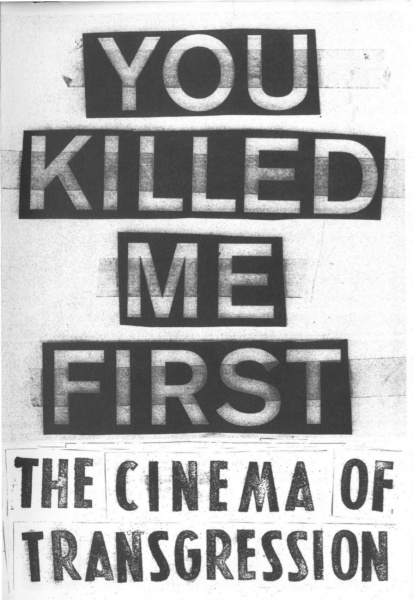You Killed Me First: The Cinema of Transgression (2012) [English/German]
Filed under catalogue | Tags: · 1980s, art, cinema, experimental film, film, horror, humour, sex, violence

“Basically, in one sentence, give us the definition of the ‘Cinema of Transgression’.” Nick Zedd: “Fuck you.”
Nightmarish scenarios of violence, dramatic states of mind, and perverse sexual abysses – the films of the Cinema of Transgression that were consciously aimed at shock, provocation, and confrontation, bear witness to an extraordinary radicality. In the 1980s a group of filmmakers from the Lower East Side in New York went on a collision course with the conventions of American society. Transcending all moral or aesthetic boundaries, the low budget films reveal social hardship met with sociopolitical indifference. Sometimes shot with stolen camera equipment, the films contain strident analyses of life in the Lower East Side defined by criminality, brutality, drugs, AIDS, sex, and excess. The catalogue is published on the occasion of the worldwide first exhibition on the Cinema of Transgression, You Killed Me First at KW Institute of Contemporary Art in Berlin.
The catalogue includes contributions by Sylvère Lotringer, Carlo McCormick, Jonas Mekas, Susanne Pfeffer, Jack Sargeant, Nick Zedd and collages by Leonard Neumann LSD.
Edited by Susanne Pfeffer
Publisher KW Institute of Contemporary Art, Berlin, and Walther Koenig, Cologne, 2012
ISBN 3863351576
176 pages
Video from exhibition (3 min)
PDF (110 MB, no OCR, updated on 2016-12-23)
Comment (0)Ed Keller, Nicola Masciandaro, Eugene Thacker (eds.): Leper Creativity: Cyclonopedia Symposium (2012)
Filed under book | Tags: · art, geophysics, geopolitics, horror, middle east, philosophy, politics, science fiction, terrorism, theory, theory-fiction, war on terror

Essays, articles, artworks, and documents taken from and inspired by the symposium on Reza Negarestani’s Cyclonopedia: Complicity with Anonymous Materials, which took place on 11 March 2011 at The New School. Hailed by novelists, philosophers, artists, cinematographers, and designers, Cyclonopedia is a key work in the emerging domains of speculative realism and theory-fiction. The text has attracted a wide-ranging and interdisciplinary audience, provoking vital debate around the relationship between philosophy, geopolitics, geophysics, and art. At once a work of speculative theology, a political samizdat, and a philosophic grimoire, Cyclonopedia is a Deleuzo-Lovecraftian middle-eastern Odyssey populated by archeologists, jihadis, oil smugglers, Delta Force officers, heresiarchs, and the corpses of ancient gods. Playing out the book’s own theory of creativity – “a confusion in which no straight line can be traced or drawn between creator and created – original inauthenticity” – this multidimensional collection both faithfully interprets the text and realizes it as a loving, perforated host of fresh heresies. The volume includes an incisive contribution from the author explicating a key figure of the novel: the cyclone.
With contributions by Robin Mackay, McKenzie Wark, Benjamin H. Bratton, Alisa Andrasek, Zach Blas, Melanie Doherty, Anthony Sciscione, Kate Marshall, Alexander R. Galloway, Eugene Thacker, Nicola Masciandaro, Dan Mellamphy & Nandita Biswas Mellamphy, Ben Woodard, Ed Keller, Lionel Maunz, Öykü Tekten, Reza Negarestani
Publisher Punctum Books, Brooklyn, New York, February 2012
ISBN 978-0615600468
Creative Commons Attribution-NonCommerical-NoDerivs 3.0 Unported License
310 pages
Leper Creativity Symposium videos
publisher
Eugene Thacker: In the Dust of This Planet (2011)
Filed under book | Tags: · black metal, demonology, horror, magic, mysticism, occultism, occultural studies, philosophy, supernatural, theology, witchcraft

The world is increasingly unthinkable, a world of planetary disasters, emerging pandemics, and the looming threat of extinction. In this book Eugene Thacker suggests that we look to the genre of horror as offering a way of thinking about the unthinkable world. To confront this idea is to confront the limit of our ability to understand the world in which we live – a central motif of the horror genre.
In the Dust of This Planet explores these relationships between philosophy and horror. In Thacker’s hands, philosophy is not academic logic-chopping; instead, it is the thought of the limit of all thought, especially as it dovetails into occultism, demonology, and mysticism. Likewise, Thacker takes horror to mean something beyond the focus on gore and scare tactics, but as the under-appreciated genre of supernatural horror in fiction, film, comics, and music. This relationship between philosophy and horror does not mean the philosophy of horror, if anything, it means the reverse, the horror of philosophy: those moments when philosophical thinking enigmatically confronts the horizon of its own existence. For Thacker, the genre of supernatural horror is the key site in which this paradoxical thought of the unthinkable takes place.
Publisher Zero Books, Winchester, UK / Washington, USA, 2011
Horror of Philosophy vol. 1
ISBN 184694676X, 9781846946769
179 pages
author (Occultural studies blog at Metamute.org)
PDF (EPUB; updated on 2012-7-25)
Comment (0)
